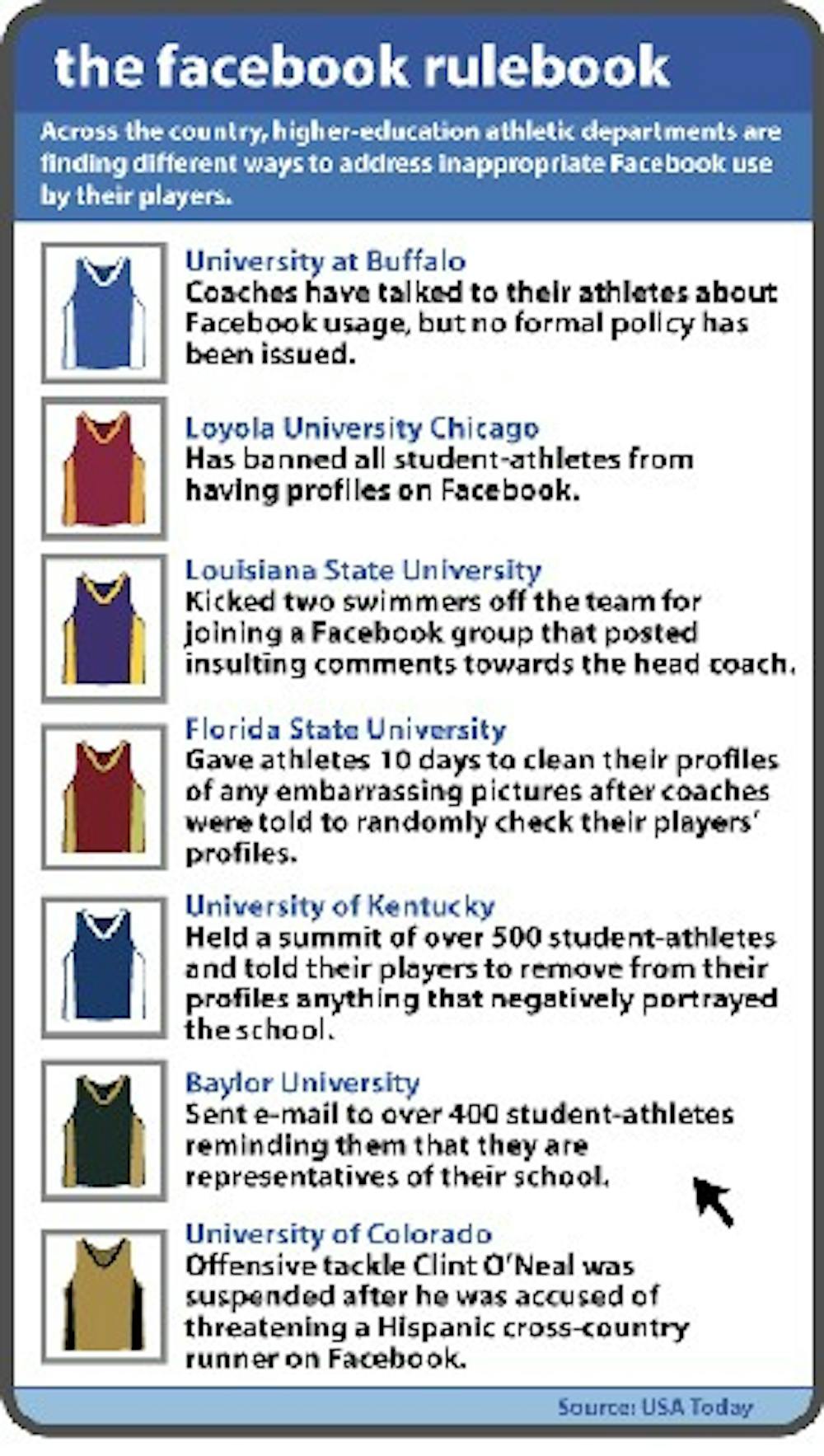Underage drinking or disrespecting coaches and teammates can threaten any student-athlete's standing, both on the field and academically. But with the recent rise in popularity of online profile sites like Facebook, that risk has become more imminent than ever.
Athletic departments in colleges across the country are now taking a proactive stand to make sure that their student-athletes represent their school in a positive manner.
According to an article in USA Today, two Louisiana State University swimmers were kicked off their team for joining a Facebook group that posted insulting remarks directed at the head coach.
Loyola University Chicago has banned all of their student athletes from having a profile on Facebook, while other schools such as Florida State University, University of Kentucky, and Baylor University have advised their athletes to be careful of what personal information they post on the Web site.
UB, however, has yet to take disciplinary action concerning athletes and Facebook. Student-Athlete Services Coordinator Kellie Peiper, who acts as a delegate with other universities on issues such as Facebook, said that the issue is recognized but no official moves have been made.
"Based on feedback from various other athletic departments," she said, "the consensus is that there are issues surrounding Facebook that must be addressed based on the potential consequences for our student-athletes."
According to head football coach Turner Gill, athletes need to know that they are different from everyday students. They represent the image of the university and are therefore subjected to greater scrutiny.
"We ask that our athletes be conscious of what they are posting," Gill said. "We can only educate our athletes so that the things they are posting are appropriate and things they would not be ashamed to show Mom or Dad."
Although at UB Facebook posts have not led to any public disciplinary actions, simple profile searches have shown UB athletes in incriminating photos.
Junior tight end Chad Upshaw of the football team is very careful about what he puts on his Facebook profile. He believes that athletes are responsible for providing a good example for their schools and their families.
"When we signed the letter of intent and accepted the full scholarship, we were agreeing to be a leader at the University," Upshaw said. "It's not too much to ask of student-athletes that they at least be responsible with the image they're putting out there, whether it be on the Internet, at a restaurant, on the team bus or on the field."
The Department of Athletics educates its athletes on decision-making and the possible repercussions for their school, team and families. Handbooks are distributed to each team member at yearly media seminars, relaying behavioral expectations and stressing the importance of role-modeling life and leadership skills.
"Our responsibility as a staff is to educate our athletes about these possible consequences," said Peiper, "and to send a clear and consistent message to our athletes that Facebook is a public domain, and therefore they do not have control over how the information they post is used."
Part of the emphasis on the importance of being a good role-model derives from the athletes themselves. The Student-Athlete Advisory Committee is a group of student-athletes assembled to provide insight on the entire student-athlete experience. This group also offers input on policies and regulations regarding things such as Facebook, and acts as a liaison between the department and the athletes.
"We discuss [Facebook] a lot because it comes up a lot," said sophomore Stephanie Bennett, a guard on the women's basketball team and SAAC member. "I don't think anybody is willing to let the athletes know that they're not allowed to have Facebook though. They just tell us to relay to our teams to take off all pictures or anything that could get them into trouble."
The UB Department of Athletics can act as a watchdog, but what ultimately appears on Facebook is up to the athletes.
"I'm sure that every athlete here has signed some piece of paper at some point or another as far as scholarships go," said Upshaw. "I'm certainly not going to give up my scholarship to keep a profile on Facebook."





